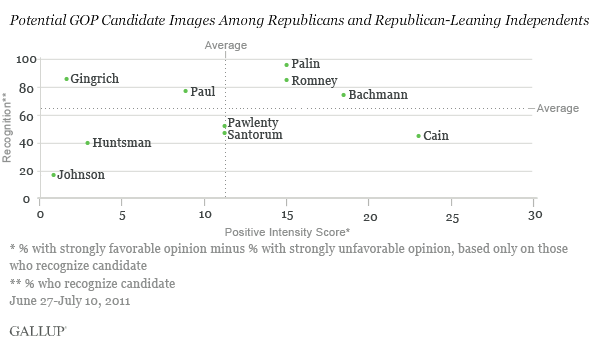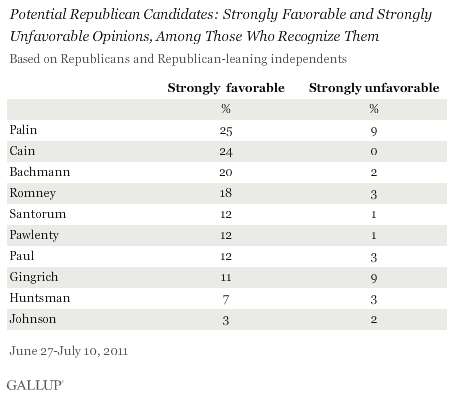PRINCETON, NJ -- Sarah Palin -- who has not yet announced whether she will run for president -- remains a formidable presence among Republicans nationwide. She is almost universally recognized, and her current Positive Intensity Score ties her with Mitt Romney, trailing only Herman Cain and Michele Bachmann.

A Newsweek cover story on the former Alaska governor and 2008 vice presidential candidate quoted Palin as saying, "I believe that I can win a national election," and that she is still thinking about running.
Palin's high 95% name recognition -- the highest of any candidate or potential candidate Gallup is tracking -- is one of her major political attributes. Her Positive Intensity Score, currently 15, has been in the 13 to 19 range throughout the year so far. This puts her behind Cain and Bachmann, but in roughly the same range as Romney. At the same time, Palin generates stronger emotions -- both positive and negative -- than Romney does. His Positive Intensity Score is based on the difference between the 18% of those who recognize him who have a strongly favorable opinion and the 3% who have a strongly unfavorable opinion. A significantly higher 25% of Republicans who recognize Palin have a strongly favorable opinion of her and a higher 9% have a strongly unfavorable opinion (Palin's net Positive Intensity Score is 15 because of rounding when precise numbers are calculated).
Palin's 25% strongly favorable rating is the highest of any candidate tested in the latest two-week average, from June 27-July 10, one percentage point ahead of Cain's 24% and five points ahead of Bachmann's 20%.

Former Speaker of the House Newt Gingrich matches Palin, with 9% expressing strongly unfavorable opinions, but, by contrast, strongly favorable opinions of him are only 11%, giving him a net Positive Intensity Score of 2 -- among the lowest of any candidate tracked. No other candidates have more than 3% expressing strongly unfavorable views of them.
Bottom Line
The GOP field to some degree is in a holding pattern, with candidates such as Palin, Texas Gov. Rick Perry, and former New York Mayor Rudy Giuliani sitting on the sidelines while pondering their decisions on whether to officially get into the race. If any or all of these politicians do decide to run, the nature of Republicans' sentiments about the candidates and whom they favor for their party's nomination may change. At the moment, Cain and Bachmann generate the highest levels of enthusiasm among rank-and-file Republicans who recognize them, with Palin and Romney trailing them. Of the remaining announced candidates, Tim Pawlenty, Rick Santorum, and Ron Paul do best, while Jon Huntsman, Gingrich, and Gary Johnson are lagging behind in terms of Positive Intensity.
Survey Methods
Results are based on telephone interviews conducted as part of Gallup Daily tracking from June 27-July 10, 2011, with random samples of Republicans and Republican-leaning independents, aged 18 and older, living in all 50 U.S. states and the District of Columbia. Questions asking about the 10 potential candidates measured in this research were rotated among randomly selected samples of Republicans each night; over the 14-day period, each candidate was rated by a minimum of 1,500 Republicans and Republican-leaning independents.
For the overall ratings of each potential candidate among Republicans and Republican-leaning independents, including recognition scores, one can say with 95% confidence that the maximum margin of sampling error is ±3 percentage points. For the Positive Intensity Score for each candidate, the maximum margin of sampling error varies depending on the size of the group recognizing the candidate.
Interviews are conducted with respondents on landline telephones and cellular phones, with interviews conducted in Spanish for respondents who are primarily Spanish-speaking. Each sample includes a minimum quota of 400 cell phone respondents and 600 landline respondents per 1,000 national adults, with additional minimum quotas among landline respondents for gender within region. Landline telephone numbers are chosen at random among listed telephone numbers. Cell phone numbers are selected using random-digit-dial methods. Landline respondents are chosen at random within each household on the basis of which member had the most recent birthday.
Samples are weighted by gender, age, race, Hispanic ethnicity, education, region, adults in the household, and phone status (cell phone only/landline only/both, cell phone mostly, and having an unlisted landline number). Demographic weighting targets are based on the March 2010 Current Population Survey figures for the aged 18 and older non-institutionalized population living in U.S. telephone households. All reported margins of sampling error include the computed design effects for weighting and sample design.
In addition to sampling error, question wording and practical difficulties in conducting surveys can introduce error or bias into the findings of public opinion polls.
For more details on Gallup's polling methodology, visit www.gallup.com.
